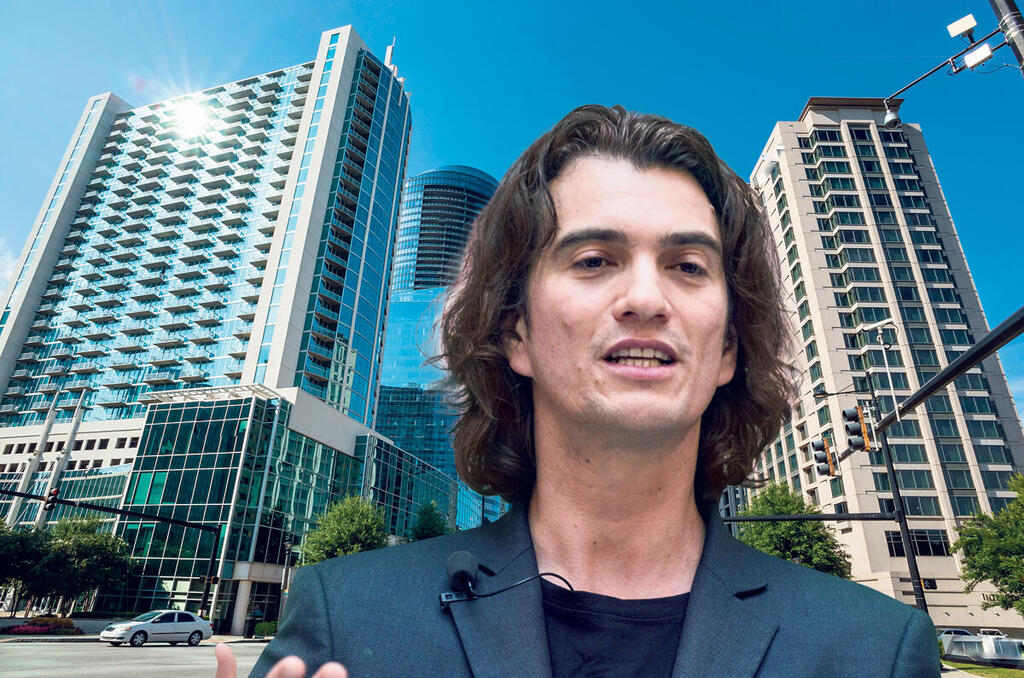
Going with the Flow: Adam Neumann wants to solve the housing crisis with a monopoly
A strong demand for houses in the U.S. in a market that suffers from a severe shortage of supply was the starting point of the Flow project, led by the founder of WeWork. The problem: the thousands of apartments that the company purchased are intended for the upper-middle class for whom there are already relevant solutions
Since it was revealed last August that Adam Neumann had raised $350 million for the Flow real estate venture from Andreessen Horowitz, very little has been reported about the new company.
Neumann rarely gives interviews to the media after the WeWork saga and has chosen to remain relatively silent. But last week, the venture capital fund Andreessen Horowitz released an hour-long interview that Neumann gave at the company's conference in November, where he and Marc Andreessen, one of the company's founders, revealed their vision for the broken American housing market through the new company Flow. "The housing crisis is one of the biggest crises the country is in," Neumann said. "But the reason it's really difficult to solve it is because the solution is between five years to a decade in the future. I think we have the right team to try."
In at least one thing, Neumann is right - the housing crisis in the U.S. is one of the worst it has ever known. The number of houses available for purchase is 40% lower than in the period before the pandemic, rent has soared to an all-time high, and mortgage interest payments are also at an all-time high. One in four renters, about 11 million people, spend more than half of their income on housing, a situation that appears to be a product of the pandemic, inflation and rising interest rates.
But the American housing market has been broken for more than 20 years. House prices fell continuously from 2006 to 2012, which led to a sharp drop in construction, and the last decade was crowned as the worst in American history in terms of house construction per capita. In exactly the same decade, the millennials reached the age when people usually purchase homes. But then the pandemic hit, and the little construction that was taking place froze due to the economic uncertainty. During this freeze and shift to working from home, the white-collar workforce pushed to improve their living conditions, driving demand for homes.
Neumann and Andreessen also identified this starting point - where white-collar workers drive demand for houses in a time of a deep supply problem, combined with skyrocketing interest rates on mortgages. Indeed, the conditions in this market are difficult. When you agree that this is the way things are, the solution or the political response seems really obvious: building houses. However, in practice, Andreessen explains, cities are slow to move and run by homeowners, which prevents them from changing.
"There is an established system with political powers of local homeowners. The system almost seems deterministic," Andreessen explained, while referring to the NIMBY (Not In My Back Yard) phenomenon, in which "local homeowners, no matter what their political background, prevent the construction of new houses. It's a real trap."
Andreessen, who did not mention that he and his wife are NIMBYs themselves and are working to stop the construction of affordable housing units in their neighborhood, went on to explain how the cities are now ripe for disruption, and that the disruption will come from within.
The mutual understanding between Andreessen and Neumann, according to which the housing market and the cities themselves are ripe for disruption, created an extraordinary partnership between the two. Andreessen's investment in Neumann's venture was the largest single investment in a startup in the history of the veteran and prestigious venture capital fund. The fact that the young project includes from the first stage a lot of money and a lot of housing units (already over 3,000 units, in Miami, Fort Lauderdale, Atlanta and Nashville), has led to great public attention and an examination of what their part will be in fixing the broken housing market, and whether the solution they offer really intends to solve the crisis. "It's very challenging to reimagine cities when they're already built," said Neumann, "we can imagine what's happening inside."
Neumann and Andreessen, however, do not really seek to disrupt the housing market, but to build a new elite product for tenants who are defined by Andreessen as "upper-middle class, highly educated people who work with a keyboard and not with their hands." This sector already rents apartments at relatively high prices, in buildings that offer advanced services such as a gym and a pool.
According to Neumann, these renters spend 35% of their salary on housing and “do not get a good deal, neither in price nor in experience.” According to him, "You move into a building and a lot of people lead sad lives. In very simple terms, we want to elevate the tenant's experience. We want to share with the tenant some of the value they create. It's hard work, but the bar is very low." With the data presented by Neumann, the segment of the population which he is targeting becomes even more refined.
Neumann's company has four pillars: a management company that manages the buildings through an app, a brokerage agency that owns the properties, a financial services company, and a "mechanism for sharing value with the value creators." According to a Bloomberg report, the financial services company is expected to include a digital wallet for cryptocurrencies. What is the value that they will share with the tenants? This section is not clear. But this division is supposed, according to Neumann, to create a sense of simulated ownership for the tenants in their properties and to keep them there for a longer period of time. If they live for a longer period, Neumann explained, the yield they will generate will grow even more, according to the flywheel principle. "If we create a better experience in the building, then the building performs better and generates a higher NOI (net operating income). If the building generates a higher NOI, we can raise more money and buy more buildings. If we buy more buildings, we can manage more buildings and have more users using these buildings, and these users will start using our financial services," he explained.
The problem that Neumann does not address is that the purchase of houses by private real estate funds is one of the causes of the housing crisis in the U.S. According to a 2022 investigation by ProPublica, in 2011 one-third of all housing units in the U.S. were held by private funds as an investment vehicle. Today, more than half of the housing units are held by private funds, with the top 35 funds owning a total of approximately one million apartments. These are not simple landlords, in fact, they use sophisticated models to find homes that will be profitable as rental properties, and offer to purchase these properties for cash, sometimes minutes after they enter the market. This way they take over entire areas, become a de facto monopoly of landlords in entire neighborhoods, and then raise the rent. ProPublica even found that landlords of this type used to coordinate the amount of rent between themselves and prevent prices from falling, even if this meant leaving properties empty for many months.
Nevertheless, Neumann remains true to his ways and explains how his value distribution mechanism as the owner of multiple properties will affect the tenants. "When you rent an apartment in an apartment building and your toilet clogs, you call the 'super' (the person responsible for the building's maintenance). But if you're in an apartment you own and your toilet clogs, you use a pump. It's the difference between feeling like you own something and feeling like you're renting. between being part of a mechanism of exchange and being part of a community." Flow's goal, Neumann explained, is to "find a way to share with the tenant some of the value it creates." This value "will make them feel ownership," he noted, but immediately noted that "ownership is a very complex word."














